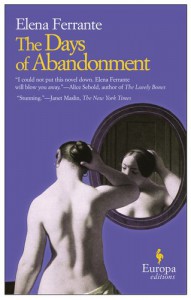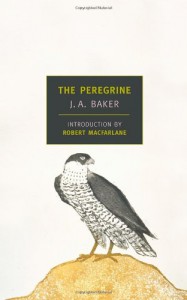The Days of Abandonment
 Ferrante is marvelous. I have a copy of 'My Brilliant Friend' and will dive into it shortly. This one is affecting without being over-the-top, a harsh portrait of abandonment, grief, and the jarring loss of one's identity.
Ferrante is marvelous. I have a copy of 'My Brilliant Friend' and will dive into it shortly. This one is affecting without being over-the-top, a harsh portrait of abandonment, grief, and the jarring loss of one's identity.
Once I Was Cool: Personal Essays
 Could've used a good deal more editing. I'm enjoying some of the essays but finding the number of errors distracting.
Could've used a good deal more editing. I'm enjoying some of the essays but finding the number of errors distracting.
All the Light We Cannot See
 After a long conversation with a trusted friend, I'm changing my rating to 3-stars. More later.
After a long conversation with a trusted friend, I'm changing my rating to 3-stars. More later.Doerr's writing is sublime, and the imagery in this book has stuck with me more than anything else I've read recently. But I'm troubled by parts of the story, and by the fact that so little here felt new to me; WW2 has been novelized over and over and over again, and there are dangers to covering such familiar ground...
Karate Chop: Stories
 *Won in a First Reads Giveaway*
*Won in a First Reads Giveaway*I picked this up as something to read while waiting for a reading to start last night and was surprised by how good it was. Crisp, intelligent writing, though I thought the last few stories weren't quite as strong as the first two-thirds. I finished it up as soon as I got home. Another great find from Graywolf.
At the Dark End of the Street: Black Women, Rape, and Resistance--A New History of the Civil Rights Movement from Rosa Parks to the Rise of Black Power
 A brilliant and distressing book, and a needed one - a must-read for anyone interested in human rights, women's history, race, and justice. One knows going in that there's likely little of the latter to be found, but story after story still evokes anger and shock.
A brilliant and distressing book, and a needed one - a must-read for anyone interested in human rights, women's history, race, and justice. One knows going in that there's likely little of the latter to be found, but story after story still evokes anger and shock.McGuire does a wonderful job of fleshing out the stories of well-known but misrepresented activists like Rosa Parks, often remembered as the weary woman too tired to give up her seat on a bus - an almost accidental symbol - rather than the fiery, lifelong activist she was. Other figures like Recy Taylor, Claudette Colvin, and Jo Ann Robinson are given proper recognition; these are women who survived unimaginable violence and injustice to spend their lives devoted to a struggle for change, and who refused to let their humanity be ignored. American history has few truly heroic figures, but there are certainly many to be found among these women.
"A black woman's body was never hers alone."
Importantly, McGuire ties in the under-explored and often untouchable subject of the underlying roles rape, sex, and gender played in racism and the civil rights movement, with the threat of black rape of white women used as a shield for the very real and unchecked epidemic of white men raping black women and murdering black men, often with no consequences whatsoever, and no protection offered to victims. It was sexual abuse and violence against women that first unified the civil rights movement, leading to the Montgomery bus boycott and some of the first court victories securing legal protection for black Americans against racial violence. However, women's roles in the movement were obscured almost immediately, both by the press and by the male leaders themselves.
I was thinking of this while re-reading Roxane Gay's essay about The Help:
http://therumpus.net/2011/08/the-solace-of-preparing-fried-foods-and-other-quaint-remembrances-from-1960s-mississippi-thoughts-on-the-help/
Gay speaks powerfully to what is left out of the modern narrative of the Jim Crow south - that things may have been bad, yes, but that's the way things were; it was another time, with as many good guys as bad guys. Such narratives, though, barely skim the surface of the true horrors of the time - in this case, 1960s Mississippi, an era and state covered in detail in At the Dark End of the Street - erasing voices like Parks's, Colvin's, and Taylor's for a feel-good story about the growth of a white protagonist. Truly, for the average American, these stories have to be sought out, as they are otherwise utterly obscured or, dangerously, forgotten.
It's a tough read, yes - one of the toughest I've read in awhile; there is no redeeming what was allowed to happen, no happy conclusion, but there is inspiration to be found in women who refused to let their humanity be stolen from them in the face of terrorism that seems so unimaginable. One can't help but see, though, how much of this legacy continues in the present day, and how high the cost of forgetting can be. There's still so much more to be done.
No One Left To Lie To: The Values of the Worst Family
 Read this one shortly after venting my frustrations with all things Clinton to a friend. No one does a take-down quite like Hitchens (for whom I have complicated feelings, possessing a brilliant mind that turned ugly in later years [partly due perhaps to years of alcoholism, but that's a separate issue]) but his vitriol gets the better of him on this one, often obscuring his very valid points about Clinton's war crimes, sex crimes, false promises, and disgusting tactics. Hitchens at certain points defends politicians against dissection of their character only to vigorously do so himself, and, let's be honest, Hitchens himself is hardly one to point the moral finger.
Read this one shortly after venting my frustrations with all things Clinton to a friend. No one does a take-down quite like Hitchens (for whom I have complicated feelings, possessing a brilliant mind that turned ugly in later years [partly due perhaps to years of alcoholism, but that's a separate issue]) but his vitriol gets the better of him on this one, often obscuring his very valid points about Clinton's war crimes, sex crimes, false promises, and disgusting tactics. Hitchens at certain points defends politicians against dissection of their character only to vigorously do so himself, and, let's be honest, Hitchens himself is hardly one to point the moral finger.That being said, it was pretty satisfying, especially for someone like me who is just not sure she can stomach voting for Hillary.
Earthflight: Breathtaking Photographs from a Bird's-Eye View of the World
 I'm a bird nerd, so I loved the photographs, and some of the behind-the-scenes info on the documentary. Doesn't compare to the actual footage, of course, so try to catch it on PBS!
I'm a bird nerd, so I loved the photographs, and some of the behind-the-scenes info on the documentary. Doesn't compare to the actual footage, of course, so try to catch it on PBS!
Men We Reaped: A Memoir
 "I knew the boys in my novel weren't as raw as they could be, weren't real. I knew they were failing as characters because I wasn't pushing them to assume the reality that my real-life boys, Demond among them, experienced every day. I loved them too much; as an author, I was a benevolent God. I protected them from death, from drug addiction, from needlessly harsh sentences in jail for doing stupid, juvenile things like stealing four-wheel ATVs. All of the young Black men in my life, in my community, had been prey to these things in real life, and yet in the lives I imagined for them, I avoided the truth. I couldn't figure out how to love my characters less. How to look squarely at what was happening to the young Black people I knew in the South, and to write honestly about that. How to be an Old Testament God."
"I knew the boys in my novel weren't as raw as they could be, weren't real. I knew they were failing as characters because I wasn't pushing them to assume the reality that my real-life boys, Demond among them, experienced every day. I loved them too much; as an author, I was a benevolent God. I protected them from death, from drug addiction, from needlessly harsh sentences in jail for doing stupid, juvenile things like stealing four-wheel ATVs. All of the young Black men in my life, in my community, had been prey to these things in real life, and yet in the lives I imagined for them, I avoided the truth. I couldn't figure out how to love my characters less. How to look squarely at what was happening to the young Black people I knew in the South, and to write honestly about that. How to be an Old Testament God."
The Peregrine
 "I have always longed to be a part of the outward life, to be out there at the edge of things, to let the human taint wash away in emptiness and silence as the fox sloughs his smell into the cold unworldliness of water; to return to the town as a stranger. Wandering flushes a glory that fades with arrival."
"I have always longed to be a part of the outward life, to be out there at the edge of things, to let the human taint wash away in emptiness and silence as the fox sloughs his smell into the cold unworldliness of water; to return to the town as a stranger. Wandering flushes a glory that fades with arrival."
Preliminary Materials for a Theory of the Young-Girl (Semiotext(e) / Intervention Series)
 "Did not like it" is an understatement. Deeply, bitterly, openly, and predictably misogynistic. Yawn.
"Did not like it" is an understatement. Deeply, bitterly, openly, and predictably misogynistic. Yawn.The Infamous Rosalie
 While reading up on Haitian writer Evelyne Trouillot, I came across a great interview she did with Edwidge Danticat:
While reading up on Haitian writer Evelyne Trouillot, I came across a great interview she did with Edwidge Danticat:http://bombsite.com/issues/90/articles/2708
In discussing a short story of hers, she had this to say:
She brings those women vividly to life in The Infamous Rosalie."We think we know our history when in fact we only know a part of it. We do not talk about the enslaved men and women, we talk about the heroes, and since most of the heroes in the traditional history books are men, we talk mostly about great men. I rather like the big mass of enslaved people, the ones I called the “invisible,” since nobody wanted to pay attention to them. And of course, there were many invisible women."
As for the novel itself - I hope to put together a more eloquent review, but it's more poignant and more full of genuine pain than anything I've read recently. She knows the history of Haiti (here still Saint-Domingue) intimately, and she spares nothing; however, she brings deep, vital humanity to the "invisible" women she hoped to pull from the shadows of the brutal past - there's inspiration to be found in the horror. I hope more of her works are available soon.
We Need New Names
 3.5 stars, maybe four - well worth a read. I’m sometimes skeptical of child narrators, but Darling is an effective protagonist; her raw, matter-of-fact depiction of her childhood in Zimbabwe casually contrasts her innocent curiosity and the games she and her friends play with the violence they encounter – death, beatings, sexual abuse, sickness, their own hunger pangs. Yet Bulawayo is clear that Zimbabwe is far more than the sum of its present atrocities; there is history, there is pride, there is home.
3.5 stars, maybe four - well worth a read. I’m sometimes skeptical of child narrators, but Darling is an effective protagonist; her raw, matter-of-fact depiction of her childhood in Zimbabwe casually contrasts her innocent curiosity and the games she and her friends play with the violence they encounter – death, beatings, sexual abuse, sickness, their own hunger pangs. Yet Bulawayo is clear that Zimbabwe is far more than the sum of its present atrocities; there is history, there is pride, there is home.I loved both sections of this book. My issues were mostly with the writing, which is occasionally too on-the-nose (see, for example, the pretty, bulimic daughter in the Invisible Children T-shirt), as if Bulawayo is making sure she hit a checklist of ironies and brutalities. The multiple shifts in POV in the final chapters seemed unnecessary. While it's a little unfair, the obvious comparison is with Americanah, and I may have been spoiled a bit by just having read that superior novel. Achichie is layered and subtle where Bulawayo is blunt and at times obvious. Both styles work, though, and I look forward to more from Bulawayo. She’s fantastic.










